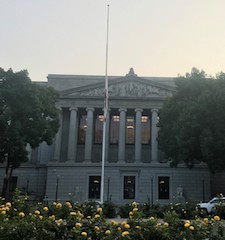On November 4, 2014, California voters approved Prop 47, which allowed the reclassification of certain felonies as misdemeanors. The felonies affected by this new law were six Penal Code provisions related to theft below $950 and forgery, as well as three Health and Safety Code provisions related to simple possession of a controlled substance.
Synopsis: Does Prop 47’s Definition of Unreasonable Risk to Public Safety Apply Retroactively to Allow Resentencing under the Three Strikes Reform Act?
Not all people are eligible for relief under Prop 47. If someone is a registered sex offender under Penal Code § 290 or has a “super strike” conviction, the conviction cannot be reduced. A “super strike” includes offenses such as murder, solicitation to commit murder, possessing a weapon of mass destruction or assault with a machine gun on a police officer or fireman.
When someone seeks resentencing under Prop 47, the judge must conduct a “thorough review” of the petitioner’s criminal history and risk assessment to ensure that they do not pose on an unreasonable danger to public safety.”
 Court of Appeal Third Appellate District Sacramento
Court of Appeal Third Appellate District Sacramento
Proposition 47 defines “unreasonable danger to public safety “as” an unreasonable risk that a petitioner will commit a new violent felony within the meaning of clause (iv) of subparagraph (c) of paragraph (2) of subdivision (e) of section 667.
Penal Code §667 (e)(2)(c)(iv) lists the following violent felonies: (1) A “sexually violent offense”… (II) Oral copulation… as defined by section 288a, sodomy… as defined by Section 286, or sexual penetration… as defined by Section 289., (III) A lewd or lascivious act.. in violation of Section 288, (IV) Any homicide offense, including any attempted murder offense… (IV) Any homicide offense, including any attempted murder offense… (V) Solicitation to commit murder, (VI) Assault with a machine gun on a police officer or firefighter… (VII) Possession of a weapon of mass destruction… (VIII) Any serious and/or violent felony offense punishable in California by life imprisonment or death.
Clifford Paul Chaney had eight strikes (convictions) involving robberies and burglaries from two separate incidents. In 2005, he was sentenced to 25 years to life in prison for a conviction for DUI with three prior convictions.
In 2012, the Three Strikes Reform Act was passed that allowed certain prisoners sentenced to an indeterminant sentence of 25 years to life under the Three Strikes Act to request resentencing. Chaney requested this decrease of his sentence because his DUI was not a strike offense. This is what the Three Strike Reform Act generally provided, subject to certain exceptions. One was that the individual must not pose an unreasonable risk to public safety, however this term was not defined by the Three Strikes Reform Act.
The trial court judge denied Chaney’s petition, finding that Chaney would pose an unreasonable risk to public safety if released.
Chaney appealed the decision. While his appeal was pending, Prop 47 was passed. Chaney read the definition of “unreasonable risk to public safety” under Prop 47 and amended his appeal to argue the definition should retroactively apply to him and, if so, the Court of Appeal should reverse the trial court.
Chaney certainly wanted the new definition to apply to his case because the offenses described as an “unreasonable risk to public safety” were all for conduct Chaney had never committed.
However, the Third District Court of Appeal, in
People v. Clifford Paul Chaney (2014 DJDAR 15934), disagreed, but on other grounds. It cited to Penal Code § 3, which states “no part of the Penal Code is retroactive, unless expressly so declared.”
People v. Brown (2012) 54 Cal. 4th 314, 319.
The Third District noted that Prop 47 was silent as to its retroactive application to proceedings under the Three Strikes Reform Act. Similarly, in reviewing its voters information guide, the appeals court found there were no arguments in favor for or against retroactive application to the Three Strikes Reform Act.
Chaney had argued in his amended appeal that
In re Estrada (1965) 63 Cal.2nd 740 applied. In
Estrada, the California Supreme Court ruled that when the legislature amends a statute to lessen punishment, it has “obviously determined that its former penalty was too severe and that a lighter punishment is proper.” The inevitable inference is that the lighter should apply retroactively.
However, the Court of Appeal in Chaney ruled that
Estrada did not apply to the Three Strikes Reform Act because Prop 47’s definition of “unreasonable risk to public safety” does not apply to reduce punishment for a particular crime. Rather, it prevents reduction of punishment.
Consequently, Chaney’s amended appeal was denied and we have a more clear understanding of the new Prop 47 and how its application is limited.
The citation for the Third District Appellate Court ruling discussed above is People v. Clifford Paul Chaney (3d App. Dist. 2014) 231 Cal.App.4th 1391, 180 Cal.Rptr.3d 443.
For more information about the issues in this article, click on the following articles:
- Proposition (Prop) 47 and What It Means for Sentencing.
- Assembly Bill 327 (AB 327)- The Fix for Unfairness in California’s Three Strikes Law?
- Resentencing a Three Strikes Sentence Often Involves Difficult Document Gathering Challenges.
Contact us.  Court of Appeal Third Appellate District Sacramento
Court of Appeal Third Appellate District Sacramento